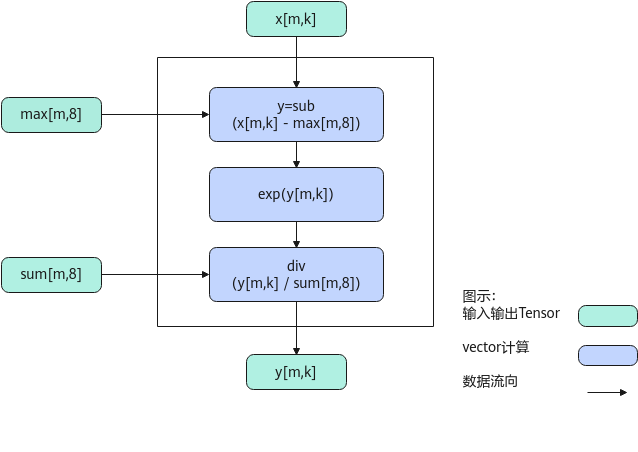SimpleSoftMax
功能说明
将输入tensor[m0, m1, ...mt, n](t大于等于0)的非尾轴长度相乘的结果看作m,则输入tensor的shape看作[m, n]。对输入tensor[m,n]按行做如下计算,与SoftMax接口不同,该接口内部没有reduce过程计算sum和max数据,而是使用计算好的sum和max数据对输入tensor做Softmax计算。计算公式如下:

为方便理解,通过python脚本实现的方式,表达其计算公式如下,其中src、max、sum是源操作数(输入),dst为目的操作数(输出)。
def simple_softmax(src, max, sum):
dst = np.exp(src - max)/sum
return dst
实现原理
以float类型,ND格式,shape为[m, k]的输入Tensor为例,描述SimpleSoftMax高阶API内部算法框图,如下图所示。

计算过程分为如下几步,均在Vector上进行:
1.sub步骤:对输入x的所有数据按行减去输入的max;
2.exp步骤:对sub之后的所有数据求exp;
3.div步骤:对exp结果的所有数据按行除以输入的sum,得到结果;
函数原型
- 接口框架申请临时空间
1 2
template <typename T, bool isReuseSource = false, bool isBasicBlock = false, bool isDataFormatNZ = false> __aicore__ inline void SimpleSoftMax(const LocalTensor<T>& dstTensor, const LocalTensor<T>& inSumTensor, const LocalTensor<T>& inMaxTensor, const LocalTensor<T>& srcTensor, const SoftMaxTiling& tiling, const SoftMaxShapeInfo& softmaxShapeInfo = {})
1 2
template <typename T, bool isReuseSource = false, bool isBasicBlock = false, bool isDataFormatNZ = false> __aicore__ inline void SimpleSoftMax(const LocalTensor<half>& dstTensor, const LocalTensor<float>& inSumTensor, const LocalTensor<float>& inMaxTensor, const LocalTensor<half>& srcTensor, const SoftMaxTiling& tiling, const SoftMaxShapeInfo& softmaxShapeInfo = {})
- 通过sharedTmpBuffer入参传入临时空间
1 2
template <typename T, bool isReuseSource = false, bool isBasicBlock = false, bool isDataFormatNZ = false> __aicore__ inline void SimpleSoftMax(const LocalTensor<T>& dstTensor, const LocalTensor<T>& inSumTensor, const LocalTensor<T>& inMaxTensor, const LocalTensor<T>& srcTensor, const LocalTensor<uint8_t>& sharedTmpBuffer, const SoftMaxTiling& tiling, const SoftMaxShapeInfo& softmaxShapeInfo = {})
1 2
template <typename T, bool isReuseSource = false, bool isBasicBlock = false, bool isDataFormatNZ = false> __aicore__ inline void SimpleSoftMax(const LocalTensor<half>& dstTensor, const LocalTensor<float>& inSumTensor, const LocalTensor<float>& inMaxTensor, const LocalTensor<half>& srcTensor, const LocalTensor<uint8_t>& sharedTmpBuffer, const SoftMaxTiling& tiling, const SoftMaxShapeInfo& softmaxShapeInfo = {})
由于该接口的内部实现中涉及复杂的计算,需要额外的临时空间来存储计算过程中的中间变量。临时空间支持接口框架申请和开发者通过sharedTmpBuffer入参传入两种方式。
- 接口框架申请临时空间,开发者无需申请,但是需要预留临时空间的大小。
- 通过sharedTmpBuffer入参传入,使用该tensor作为临时空间进行处理,接口框架不再申请。该方式开发者可以自行管理sharedTmpBuffer内存空间,并在接口调用完成后,复用该部分内存,内存不会反复申请释放,灵活性较高,内存利用率也较高。
接口框架申请的方式,开发者需要预留临时空间;通过sharedTmpBuffer传入的情况,开发者需要为tensor申请空间。临时空间大小BufferSize的获取方式如下:通过SoftMax/SimpleSoftMax Tiling中提供的GetSoftMaxMaxTmpSize/GetSoftMaxMinTmpSize接口获取所需最大和最小临时空间大小,最小空间可以保证功能正确,最大空间用于提升性能。
参数说明
|
参数名 |
描述 |
||
|---|---|---|---|
|
T |
操作数的数据类型。 |
||
|
isReuseSource |
预留参数,暂未启用,为后续的功能扩展做保留,必须使用默认值false。 |
||
|
isBasicBlock |
srcTensor和dstTensor的shape信息和Tiling切分策略满足基本块要求的情况下,可以使能该参数用于提升性能,默认不使能。基本块要求如下:
针对Atlas 200/500 A2推理产品,该参数为预留参数,暂未启用,为后续的功能扩展做保留,保持默认值即可。 |
||
|
isDataFormatNZ |
当前输入输出的数据格式是否为NZ格式,默认数据格式为ND,即默认取值为false。 针对Atlas 200/500 A2推理产品,不支持配置为NZ格式。 |
||
|
SoftmaxConfig |
结构体模板参数,此参数可选配,具体定义如下:
配置示例如下: constexpr SoftmaxConfig SOFTMAX_DEFAULT_CFG = {true, 0, 0};
此参数一般用于配合kernel侧tiling计算的接口使用。 Atlas A2训练系列产品/Atlas 800I A2推理产品,支持该参数。 针对Atlas推理系列产品AI Core,该参数为预留参数,暂未启用,保持默认值即可。 针对Atlas 200/500 A2推理产品,该参数为预留参数,暂未启用,保持默认值即可。 |
|
参数名 |
输入/输出 |
描述 |
|---|---|---|
|
dstTensor |
输出 |
目的操作数。 类型为LocalTensor,支持的TPosition为VECIN/VECCALC/VECOUT。 Atlas A2训练系列产品/Atlas 800I A2推理产品,支持的数据类型为:half/float Atlas推理系列产品AI Core,支持的数据类型为:half/float Atlas 200/500 A2推理产品,支持的数据类型为:half/float dstTensor的shape和源操作数srcTensor一致。 |
|
inSumTensor |
输入 |
源操作数。 类型为LocalTensor,支持的TPosition为VECIN/VECCALC/VECOUT。 Atlas A2训练系列产品/Atlas 800I A2推理产品,支持的数据类型为:half/float Atlas推理系列产品AI Core,支持的数据类型为:half/float Atlas 200/500 A2推理产品,支持的数据类型为:half/float softmax计算所需要的sum值。
|
|
inMaxTensor |
输入 |
源操作数。 类型为LocalTensor,支持的TPosition为VECIN/VECCALC/VECOUT。 Atlas A2训练系列产品/Atlas 800I A2推理产品,支持的数据类型为:half/float Atlas推理系列产品AI Core,支持的数据类型为:half/float Atlas 200/500 A2推理产品,支持的数据类型为:half/float softmax计算所需要的max值。
|
|
srcTensor |
输入 |
源操作数。 类型为LocalTensor,支持的TPosition为VECIN/VECCALC/VECOUT。 Atlas A2训练系列产品/Atlas 800I A2推理产品,支持的数据类型为:half/float Atlas推理系列产品AI Core,支持的数据类型为:half/float Atlas 200/500 A2推理产品,支持的数据类型为:half/float last轴长度需要32B对齐。 |
|
sharedTmpBuffer |
输入 |
临时空间。 类型为LocalTensor,支持的TPosition为VECIN/VECCALC/VECOUT。 该操作数的数据类型固定uint8_t。 接口内部复杂计算时用于存储中间变量,由开发者提供。 临时空间大小BufferSize的获取方式请参考SoftMax/SimpleSoftMax Tiling。 |
|
tiling |
输入 |
softmax计算所需tiling信息,Tiling信息的获取请参考SoftMax/SimpleSoftMax Tiling。 |
|
softmaxShapeInfo |
输入 |
srcTensor的shape信息。SoftMaxShapeInfo类型,具体定义如下: struct SoftMaxShapeInfo {
uint32_t srcM; // 非尾轴长度的乘积
uint32_t srcK; // 尾轴长度,必须32Byte对齐
uint32_t oriSrcM; // 原始非尾轴长度的乘积
uint32_t oriSrcK; // 原始尾轴长度
};
需要注意,当输入输出的数据格式为NZ格式时,尾轴长度为reduce轴长度即图2中的W0*W1,非尾轴为H0*H1。 |
返回值
无
支持的型号
Atlas A2训练系列产品/Atlas 800I A2推理产品
Atlas推理系列产品AI Core
Atlas 200/500 A2推理产品
注意事项
- srcTensor和dstTensor的Tensor空间可以复用。
- inSumTensor和inMaxTensor为输入,并且last轴长度必须固定32Byte。
- inSumTensor和inMaxTensor的数据类型需要保持一致。
- 操作数地址偏移对齐要求请参见通用约束。
调用示例
#include "kernel_operator.h"
template <typename T>
class KernelSimpleSoftmax {
public:
__aicore__ inline KernelSimpleSoftmax()
{}
__aicore__ inline void Init(__gm__ uint8_t *srcGm, __gm__ uint8_t *inMaxGm, __gm__ uint8_t *inSumGm,
__gm__ uint8_t *dstGm, const SoftMaxTiling &tilingData)
{
elementNumPerBlk = 32 / sizeof(T);
srcGlobal.SetGlobalBuffer((__gm__ T *)srcGm);
dstGlobal.SetGlobalBuffer((__gm__ T *)dstGm);
maxGlobal.SetGlobalBuffer((__gm__ T *)inMaxGm);
sumGlobal.SetGlobalBuffer((__gm__ T *)inSumGm);
pipe.InitBuffer(inQueueSrc, 1, height * width * sizeof(T));
pipe.InitBuffer(maxQueue, 1, height * elementNumPerBlk * sizeof(T));
pipe.InitBuffer(sumQueue, 1, height * elementNumPerBlk * sizeof(T));
pipe.InitBuffer(outQueueDst, 1, height * width * sizeof(T));
tiling = tilingData;
}
__aicore__ inline void Process()
{
CopyIn();
Compute();
CopyOut();
}
private:
__aicore__ inline void CopyIn()
{
AscendC::LocalTensor<T> srcLocal = inQueueSrc.AllocTensor<T>();
AscendC::LocalTensor<T> sumTempLocal = sumQueue.AllocTensor<T>();
AscendC::LocalTensor<T> maxTempLocal = maxQueue.AllocTensor<T>();
AscendC::DataCopy(srcLocal, srcGlobal, height * width);
AscendC::DataCopy(sumTempLocal, sumGlobal, height * elementNumPerBlk);
AscendC::DataCopy(maxTempLocal, maxGlobal, height * elementNumPerBlk);
inQueueSrc.EnQue(srcLocal);
sumQueue.EnQue(sumTempLocal);
maxQueue.EnQue(maxTempLocal);
}
__aicore__ inline void Compute()
{
AscendC::LocalTensor<T> srcLocal = inQueueSrc.DeQue<T>();
AscendC::LocalTensor<T> sumTempLocal = sumQueue.DeQue<T>();
AscendC::LocalTensor<T> maxTempLocal = maxQueue.DeQue<T>();
AscendC::LocalTensor<T> dstLocal = outQueueDst.AllocTensor<T>();
AscendC::SoftMaxShapeInfo srcShape = {height, width, height, width};
AscendC::SimpleSoftMax<T>(dstLocal, sumTempLocal, maxTempLocal, srcLocal, tiling, srcShape);
outQueueDst.EnQue<T>(dstLocal);
maxQueue.FreeTensor(maxTempLocal);
sumQueue.FreeTensor(sumTempLocal);
inQueueSrc.FreeTensor(srcLocal);
}
__aicore__ inline void CopyOut()
{
AscendC::LocalTensor<T> dstLocal = outQueueDst.DeQue<T>();
AscendC::DataCopy(dstGlobal, dstLocal, height * width);
outQueueDst.FreeTensor(dstLocal);
}
private:
AscendC::TPipe pipe;
AscendC::TQue<AscendC::QuePosition::VECIN, 1> inQueueSrc;
AscendC::TQue<AscendC::QuePosition::VECIN, 1> maxQueue;
AscendC::TQue<AscendC::QuePosition::VECIN, 1> sumQueue;
AscendC::TQue<AscendC::QuePosition::VECOUT, 1> outQueueDst;
AscendC::GlobalTensor<T> srcGlobal, dstGlobal;
AscendC::GlobalTensor<T> maxGlobal, sumGlobal;
uint32_t elementNumPerBlk = 0;
uint32_t width = 64;
uint32_t height = 320;
SoftMaxTiling tiling;
};
extern "C" __global__ __aicore__ void simple_softmax_kernel_half(__gm__ uint8_t *srcGm, __gm__ uint8_t *inMaxGm,
__gm__ uint8_t *inSumGm, __gm__ uint8_t *dstGm, __gm__ uint8_t *tiling)
{
GET_TILING_DATA(tilingData, tiling);
KernelSimpleSoftmax<half> op;
op.Init(srcGm, inMaxGm, inSumGm, dstGm, tilingData.softmaxTilingData);
op.Process();
}